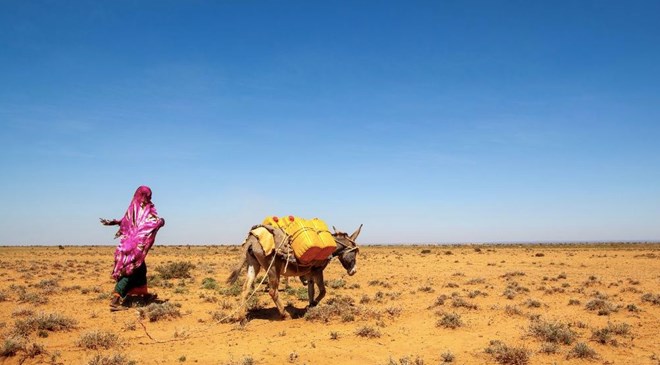Destroying crops, killing livestock, Eastern Africa’s worst drought season in decades has led to famine and the mass displacement of people across Somalia.
Somalia has been facing an unprecedented drought following three consecutive failed rainy seasons that has led to the displacement and death of scores of people.
The UN agency World Food Programme (WFP) estimates that 13 million people in Kenya, Somalia and Ethiopia are facing severe hunger due to extreme dry conditions.
Last month, the WFP called for $327 million in funds to help 4.5 million people become “more resilient to climate extremes” in Ethiopia, Kenya and Somalia.
The crisis has led international organisations scrambling to avoid a repeat of the 2011 drought in Somalia that led to the death of around 250,000 people from hunger.
In an effort to stop history repeating itself, international charity organisation Islamic Relief wants to be “as proactive as we can, as part of the NGOs community in Somalia,” the group’s country director for Somalia, Aliow Mohamed, told TRT World.
The organisation assists people across nearly 40 countries who have been affected by natural and manmade disasters. It doubled its Hunger Appeal to $26 million last month, to collect funds for the drought-stricken country and its neighbours.
“Somalia has not received enough rainfall for the last three years and the situation has just been getting worse,” Mohamed said, explaining that 90 percent of the country is currently facing severe drought conditions.
This year, Mohamed’s team visited the Iftin camp for internally displaced people (IDP) in Somalia’s Bardhere district in the Gedo region, where authorities reported 118 people died within one week.
“Two weeks ago we visited a camp and our team [saw] a number of children dying, people with no basic health care and facilities such as food and water,” said Mohamed.
And yet as the drought continues, the number of families coming to the camp seeking aid grows each day. During their visit, Mohamed said there were 2,319 families at the camp but just over a week later this number reached 3,375 families.
Currently, Islamic Relief has enough aid to assist 400 families for four months in Somalia until the next rainfall, but as camp numbers grow, resources are being “stretched beyond expectation,” says Mohamed.
“The challenge our team are reporting [is] the moment people know there is food or some aid is being provided in a certain camp, they tell one another so everyone will now come to this camp,” said Mohamed, warning that this influx strains limited resources.
Source: TRTWorld







